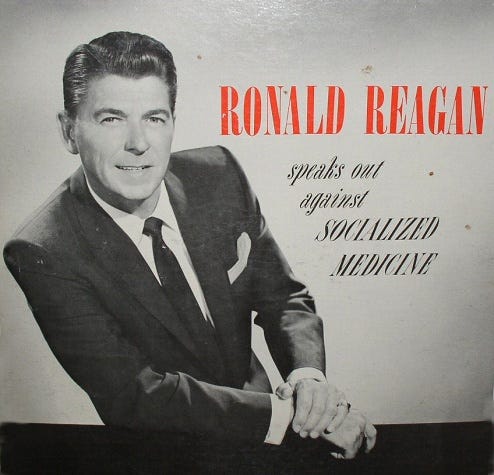Pharma Companies Agree To Negotiate Medicare Drug Prices, Tyrant Socialism Ensues
There there ... you'll still be filthy rich multinational titans.

The Biden administration announced Tuesday that all the manufacturers of the first 10 prescription drugs selected for price negotiations with Medicare have signed agreements to participate in the negotiations, even if some of them are still mewling about having to come to the table. The announcement came a little over a month after the administration announced the drugs that would be included in price negotiations, a goal Democrats have pursued for decades; they were passed as part of last year’s Inflation Reduction Act (IRA). The White House announcement made a point of emphasizing that not a single Republican in Congress voted for the bill.
The administration notes that the first 10 prescription drugs chosen for negotiations currently result in about $3.4 billion in out-of-pocket costs for some 9 million Medicare enrollees. Because this is a completely new process, though, it will take a little while to roll out. The Centers for Medicare and Medicaid Services (CMS) will announce the final negotiated negotiated prices for these 10 drugs next year, and the prices will go into effect in 2026. After that, though, more drugs will be negotiated each year going forward.
Other forms of Medicare drug price relief are already on the way. In addition to the already-enacted price cap on insulin of $35 per month, next year, Medicare Part D recipients will no longer have to pay the current 5 percent co-insurance when they reach the “catastrophic” level of benefits, a big savings for many patients with the highest costs. And in 2025, out-of-pocket costs for Part D will be capped at $2,000 annually, which again will be a huge savings for seniors facing the highest drug prices even before the negotiated prices kick in.
Here again are the drugs whose prices will be negotiated; see how many of their jingles you recognize from ads on MSNBC:
Eliquis, a blood thinner
Xarelto, a blood thinner
Januvia, a diabetes drug
Jardiance, a diabetes drug
Enbrel, a rheumatoid arthritis drug
Imbruvica, a drug for blood cancers
Farxiga, a drug for diabetes, heart failure and chronic kidney disease
Entresto, a heart failure drug
Stelara, a drug for psoriasis and Crohn's disease
Fiasp and NovoLog, for diabetes
It’s also worth noting, as NPR reports, that about a third of the companies that make the drugs are in the process of suing to block the negotiations, although they have also signed the negotiation agreements just in case they gotta end up negotiating; those agreements were due on October 1.
Many of the drugmakers told NPR they had no choice. They could either agree to negotiate, pay steep fines or withdraw all their products from the Medicare and Medicaid markets.
"While we disagree on both legal and policy grounds with the IRA's new program, withdrawing all of the company's products from Medicare and Medicaid would have devastating consequences for the millions of Americans who rely on our innovative medicines, and it is not tenable for any manufacturer to abandon nearly half of the U.S. prescription drug market," a Merck spokesperson wrote in an email to NPR.
Merck is one of the companies suing the government, and makes the diabetes drug Januvia that’s up there on the list.
The pharma industry argues that negotiating prices will stifle innovation and research, which is what they always cry with big wet tears that you can plainly see on camera. However, an analysis by the Congressional Budget Office found that the IRA’s effect on drug development would be minimal, while saving Medicare some $237 billion over 10 years, of which $98.5 billion would come from the drug price negotiations.
The White House anticipated those crocodile tears from Big Pharma, noting in its August announcement of the first 10 drugs to be negotiated that the industry has actually “spent more on stock buybacks and dividends than they spent on research and development,” even while Americans often have to decide whether to pay for meds or rent.
Last week, a federal judge in Dayton, Ohio, ruled that the drug price negotiation program could move forward, turning down a request for an injunction in a lawsuit brought against the law by the US Chamber of Commerce. US District Judge Michael Newman, a Trump appointee, denied the injunction, finding that pharmaceutical companies weren’t likely to win their case anyway since their participation in Medicare is “completely voluntary.” Newman allowed the lawsuit to continue, however.
As of yet, dire predictions that federal intervention in healthcare will result in the end of liberty continue to not come true, no matter how many times that old Ronald Reagan recording from 1961 gets dragged out, the end.
[White House / NPR / Reuters]
Yr Wonkette is funded entirely by reader donations. If you can, please subscribe, or if it’s more convenient, make a one-time donation with the red socialist button below!





Also too, arigato to Yr Editrix for "mewling," a far better verb than my "sniffling."
Fun anecdote. About 25 years ago, I was on a flight to Chicago sitting next to a middle-aged guy who was going to a medical conference. He was a research professor at (I think) Cornell Medical Center in NYC. He was a cardiologist specializing in the connections between obesity and heart disease. I myself was on my way to a publishing conference, so I asked him what sessions and presentations he was going to see and what new research he was going to present.
He looked at me like I was from Mars and said, "Oh, I don't go to that stuff. I'm going to be meeting with pharmaceutical companies to talk about the rollout of the drug I've been working on." He was very excited because obesity and heart disease are very prevalent in the US and lots and lots of people were going to want this drug.
I asked him if he liked teaching or research better. Dumb Martian me. He said, "Oh, I don't teach" (he spat the word). He then told me he was going to share the patent with Cornell. After which he also told me that the entire research program that had developed the drug had been funded by the NIH and other federal sources. All of it. So I said, "Shouldn't the US government hold the patent, then?"
We didn't talk any more after that. Awkward flight.